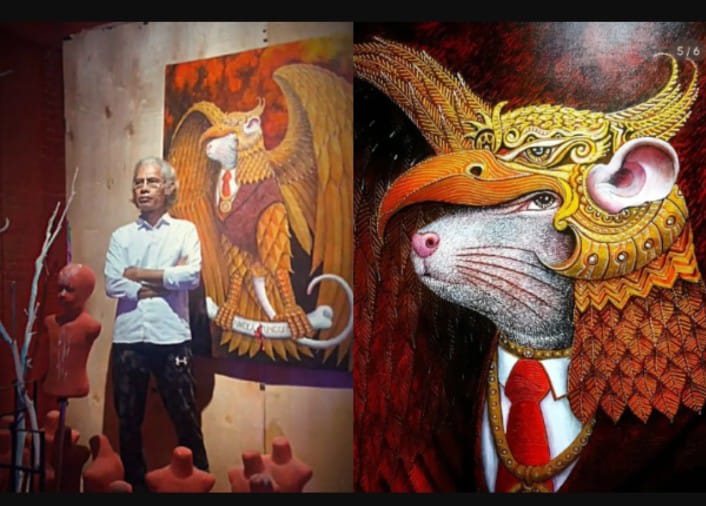
Robert Draws – The “Rat-Garuda” painting by artist Rokhyat has stirred controversy in Indonesia, particularly after it was removed from a recent exhibition at Badri Gallery in Banjarmasin. The painting, which depicts a Garuda bird with a rat’s head and tail, raised concerns about its portrayal of national symbols. However, Fadli Zon, Indonesia’s Minister of Culture, has defended the artwork, stating that it remains within the boundaries of artistic freedom and should be regarded as a valid form of expression.
Fadli Zon emphasized that the painting should not be seen as an attack on the national symbol of Garuda. He pointed out that the bird in the artwork was not intended to represent the official emblem of Indonesia. “It is a Garuda, an eagle, or something similar,” he said, stressing that the work was simply a part of artistic expression. Fadli reassured the public that the artwork did not intend to provoke division or unrest, but rather aimed to challenge traditional artistic forms. He argued that art often requires pushing boundaries, and in this case, the painting should be seen as an exploration of creative possibilities.
“Read about: Lian Sahar’s Solo Exhibition Opens at Lawangwangi Gallery, Bandung”
During his visit to the Military Academy in Magelang on February 26, 2025, Fadli discussed the importance of freedom of expression in Indonesia. He acknowledged that while everyone is entitled to express themselves, it is essential to respect cultural sensitivities. “Freedom of expression also has its limits,” Fadli stated, emphasizing the importance of not touching upon sensitive issues like race, religion, or ethnicity. These topics, he noted, could lead to social divisions. However, he also clarified that Indonesia tolerates artistic freedom more than neighboring countries with stricter regulations on expression.
The removal of the “Rat-Garuda” painting was initially attributed to safety concerns. However, Fadli clarified that the gallery management decided to take the painting down, not due to a government order, but rather due to worries about public reactions. “Perhaps there was a fear that people might engage in vandalism or something like that,” he speculated. Fadli’s comments highlight the delicate balance between artistic expression and societal reactions. The authorities made the decision to remove the artwork, though controversial, to avoid potential conflict rather than responding to any formal directives.
“Read more: Top Global Spotify February 2025: Die With A Smile has Manages to Return to Rank 1”
Art plays an essential role in society, offering a platform for individuals to express their views. It challenges established norms, pushing society to reconsider its values and beliefs. Through art, people can reflect on cultural issues, making sense of the world around them. Fadli believes that fostering a creative environment is crucial for the growth of the arts. Artists must have the freedom to produce thought-provoking works without the fear of censorship. This freedom allows them to explore new ideas and present bold messages. Fadli emphasized the importance of protecting artistic freedom, ensuring artists can create without limitation. He also pointed out that Indonesia’s legal framework is supportive of this freedom. The country offers more room for artistic expression compared to many of its neighbors. This is an important aspect of Indonesian democracy, where creativity can thrive without excessive restrictions. Fadli sees this legal support as a significant strength in encouraging artistic growth. It ensures that artists can contribute meaningfully to the country’s cultural and social development. According to Fadli, this open approach to creativity fosters a more diverse and dynamic cultural landscape.
While Fadli defended the painting’s artistic value, he also acknowledged the need for balance. He urged artists and the public to exercise their freedom of expression responsibly. This ensures that such expressions do not disrupt social harmony. Fadli’s perspective highlights the complexity of maintaining artistic freedom in a diverse society. Though the “Rat-Garuda” painting shocked some, he maintains it is part of a broader conversation about art. It reflects its place in Indonesian culture. Fadli Zon’s comments show a nuanced understanding of art in a democratic society. He recognizes the importance of artistic expression but cautions that freedom carries responsibility. He urges avoiding harm or division through artistic works. The debate surrounding the “Rat-Garuda” painting may have caused tensions. However, it serves as a reminder of the complex relationship between art and society. It reflects the role of freedom of expression in Indonesia.